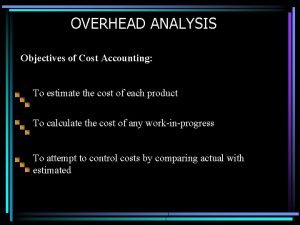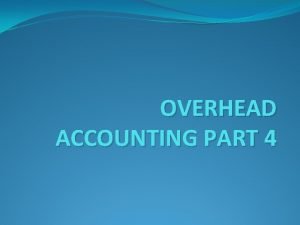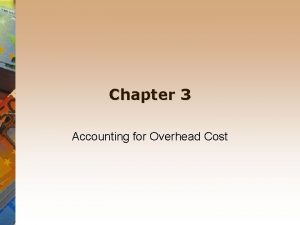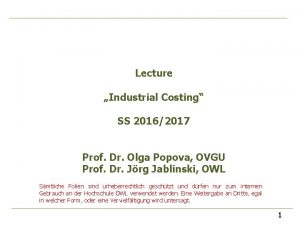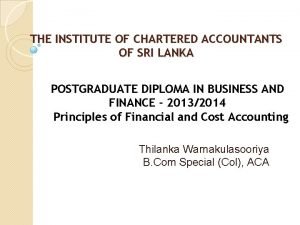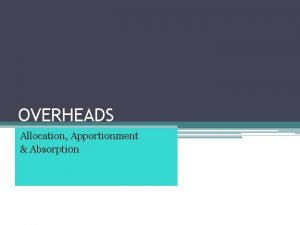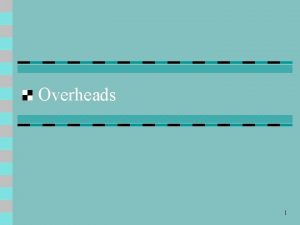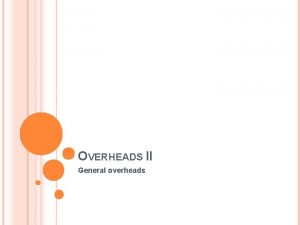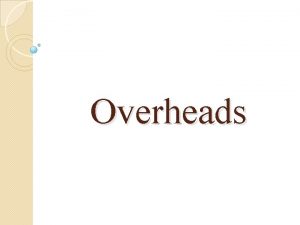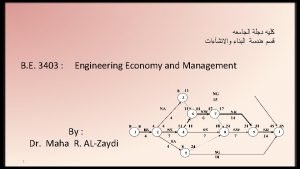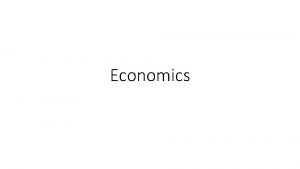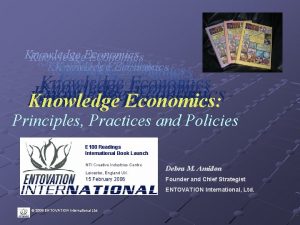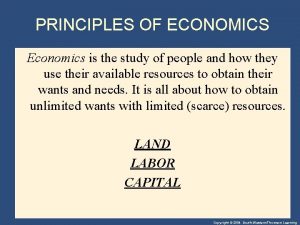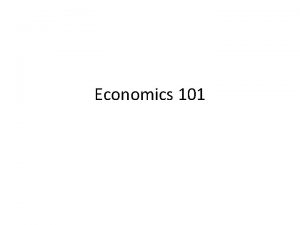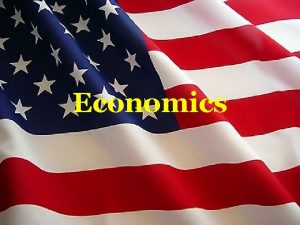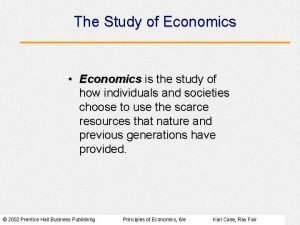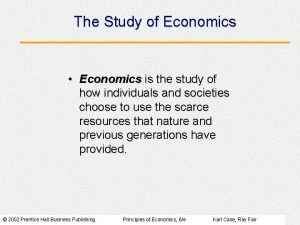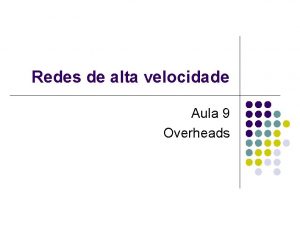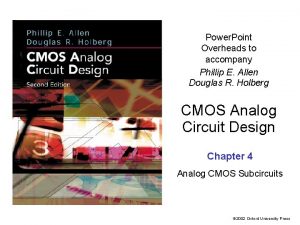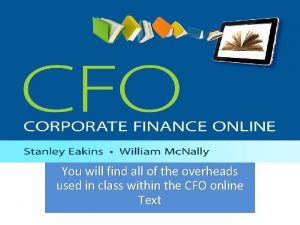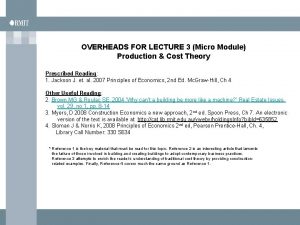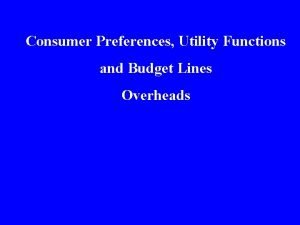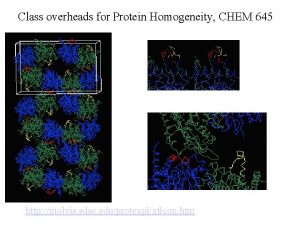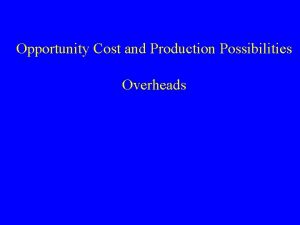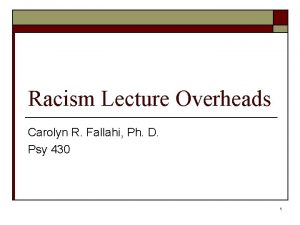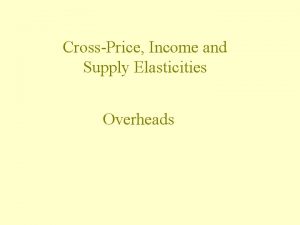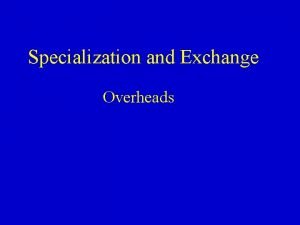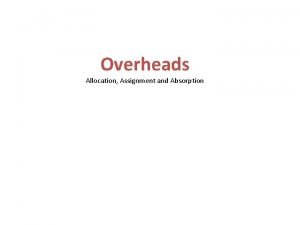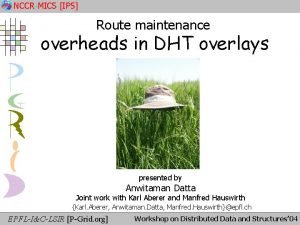Overheads Principles of Economics Economics is the study





































- Slides: 37

Overheads Principles of Economics

Economics is the study of choice … under conditions of scarcity. Economics is the study of choice… with constraints.

Economics is the study of how individuals and societies choose to employ scarce resources that could have alternative uses to produce goods and services, and to distribute them, now or in the future, among various individuals and groups in society.

The fundamental unit of analysis in economics is the economic agent.

The underlying assumption in economic analysis is that all economic agents possess a preference ordering which allows them to rank alternative states of the world.

Examples Basketball versus wrestling Candy Snickers - Butterfinger Reese’s Pieces - DOTS

The behavioral assumption in economics is that all agents make choices that are consistent with their underlying preferences.

Scarcity is a situation in which the amount of something available is insufficient to satisfy everyone’s desire for it.

Resources are anything that can be used directly or indirectly to satisfy human wants. We sometimes call resources factors of production because they are utilized to produce the goods and services we use for consumption.

Three types of resources land, which is physical space together with the natural resources found above or beneath it labor, which is the time human beings spend producing goods and services

capital, which is a long-lasting resource (not used up in the process) used to produce goods and services physical capital, which is tools, machines, buildings, terraces human capital, which is the natural abilities, skills, and training of labor

Production systems, goods, services, and factors A production system or technology is a description of the set of outputs that can be produced by a given set of factors of production (or inputs) inputs using a given method of production or production process.

A factor of production (input) is a good or service that is employed in the production process. A product is a good or service that is the output of a particular production process.

There are three types of factors of production (inputs) Expendables Capital Services

Expendable factors of production are raw materials or produced factors that are completely used up or consumed during a single production period.

Capital is a stock that is not used up during a single production period, provides services over time, and retains a unique identity.

Capital services are the flow of productive services that can be obtained from a given capital stock during a production period. They arise from a specific item of capital rather than from a production process. It is usually possible to separate the right to use services from ownership of the capital good.

The economic environment and “outcomes” of the economic system Actions taken by any agent depend on the opportunities presented to that agent. These opportunities depend on the economic environment of the agent.

The economic environment is determined (constrained) by: 1. 2. basic physical and biological properties of the world in which the agent lives, the man-made technologies available and in use, 3. the actions of other agents, 4. the institutional framework of the economic system, and 5. other legal, social or moral limits on choice.

Outcomes for each Agent in the System Outcomes are things that happen in an economic system. Receive paycheck, buy a bike wheel, get wheel Quit job, move, get new job, get fired

Given a particular economic environment and a set of choices for each agent, we can determine the outcome for each agent, depending on the actions of all the agents in the system.

Market Example Agent 1 with candy Agent 2 with candy Agent 3 who is a trader

Positive, Normative and Conditionally Normative Economics Positive economics deals with how (why) the economy works. Positive economic analysis is the process of under-standing, describing and predicting economic behavior.

Examples Price of gasoline What happens to corn supply when the price of corn rises? What happens to the supply of housing if rent controls are imposed?

Normative economics concerns itself with what should be. Normative economic analysis is the process of determining what "ought to be" or how to use resources optimally so as to achieve the maximum wellbeing for individuals in society.

Examples Should we build a bridge over the Snake River? Should a tariff on textiles be removed? Should the government pay workers displaced by mechanical tomato harvesters? Should Farmer Oleson plant wheat or oats?

Conditional normative analysis Conditional normative economics concerns itself with under-standing, describing and predicting economic behavior. . . by assuming that agents make choices according to some rule, determining their optimal response given that rule, and then using these derived expressions to test various positive hypotheses.

Examples Chocolate content assumption Which food is chosen? Distance from campus assumption? Which apartment is chosen?

Economic Models A model is an abstract representation of reality. A model represents the real world.

We follow the principle that a model should be as simple as possible to accomplish its purpose. The model should contain necessary details, but no unnecessary ones. We call this “no fat’ modeling.

Example Types of maps Ames to Lincoln Find 2818 Sunset Drive

Assumptions are things that we take to be true in forming a model, without necessarily providing evidence that they are true.

simplifying assumption – any assumption that makes a model simpler without affecting any of its important conclusions. critical assumption any assumption that affects the conclusions of a model in an important way.

Two fundamental assumptions in economics Every economic agent tries to make the best out of any situation. (Maximization hypothesis) Every economic agent faces constraints.

The End

What are the 3 types of factors of production? (Not resources) Think of a couple examples of each

Economics is the study of how individuals and societies _____ to employ ____________ that could have alternative uses to _____ and ______, and _____ them, now or in the future, among various ____________ in society.
 Overhead analysis
Overhead analysis Supplementary rate in overheads
Supplementary rate in overheads How to calculate oar
How to calculate oar Primary distribution of overheads
Primary distribution of overheads Classification of overhead
Classification of overhead Allocation apportionment and absorption of overheads
Allocation apportionment and absorption of overheads Hát kết hợp bộ gõ cơ thể
Hát kết hợp bộ gõ cơ thể Slidetodoc
Slidetodoc Bổ thể
Bổ thể Tỉ lệ cơ thể trẻ em
Tỉ lệ cơ thể trẻ em Gấu đi như thế nào
Gấu đi như thế nào Tư thế worm breton
Tư thế worm breton Bài hát chúa yêu trần thế alleluia
Bài hát chúa yêu trần thế alleluia Môn thể thao bắt đầu bằng từ đua
Môn thể thao bắt đầu bằng từ đua Thế nào là hệ số cao nhất
Thế nào là hệ số cao nhất Các châu lục và đại dương trên thế giới
Các châu lục và đại dương trên thế giới Công thức tính độ biến thiên đông lượng
Công thức tính độ biến thiên đông lượng Trời xanh đây là của chúng ta thể thơ
Trời xanh đây là của chúng ta thể thơ Mật thư tọa độ 5x5
Mật thư tọa độ 5x5 101012 bằng
101012 bằng Phản ứng thế ankan
Phản ứng thế ankan Các châu lục và đại dương trên thế giới
Các châu lục và đại dương trên thế giới Thơ thất ngôn tứ tuyệt đường luật
Thơ thất ngôn tứ tuyệt đường luật Quá trình desamine hóa có thể tạo ra
Quá trình desamine hóa có thể tạo ra Một số thể thơ truyền thống
Một số thể thơ truyền thống Cái miệng nó xinh thế chỉ nói điều hay thôi
Cái miệng nó xinh thế chỉ nói điều hay thôi Vẽ hình chiếu vuông góc của vật thể sau
Vẽ hình chiếu vuông góc của vật thể sau Nguyên nhân của sự mỏi cơ sinh 8
Nguyên nhân của sự mỏi cơ sinh 8 đặc điểm cơ thể của người tối cổ
đặc điểm cơ thể của người tối cổ Giọng cùng tên là
Giọng cùng tên là Vẽ hình chiếu đứng bằng cạnh của vật thể
Vẽ hình chiếu đứng bằng cạnh của vật thể Phối cảnh
Phối cảnh Thẻ vin
Thẻ vin đại từ thay thế
đại từ thay thế điện thế nghỉ
điện thế nghỉ Tư thế ngồi viết
Tư thế ngồi viết Diễn thế sinh thái là
Diễn thế sinh thái là Dạng đột biến một nhiễm là
Dạng đột biến một nhiễm là
